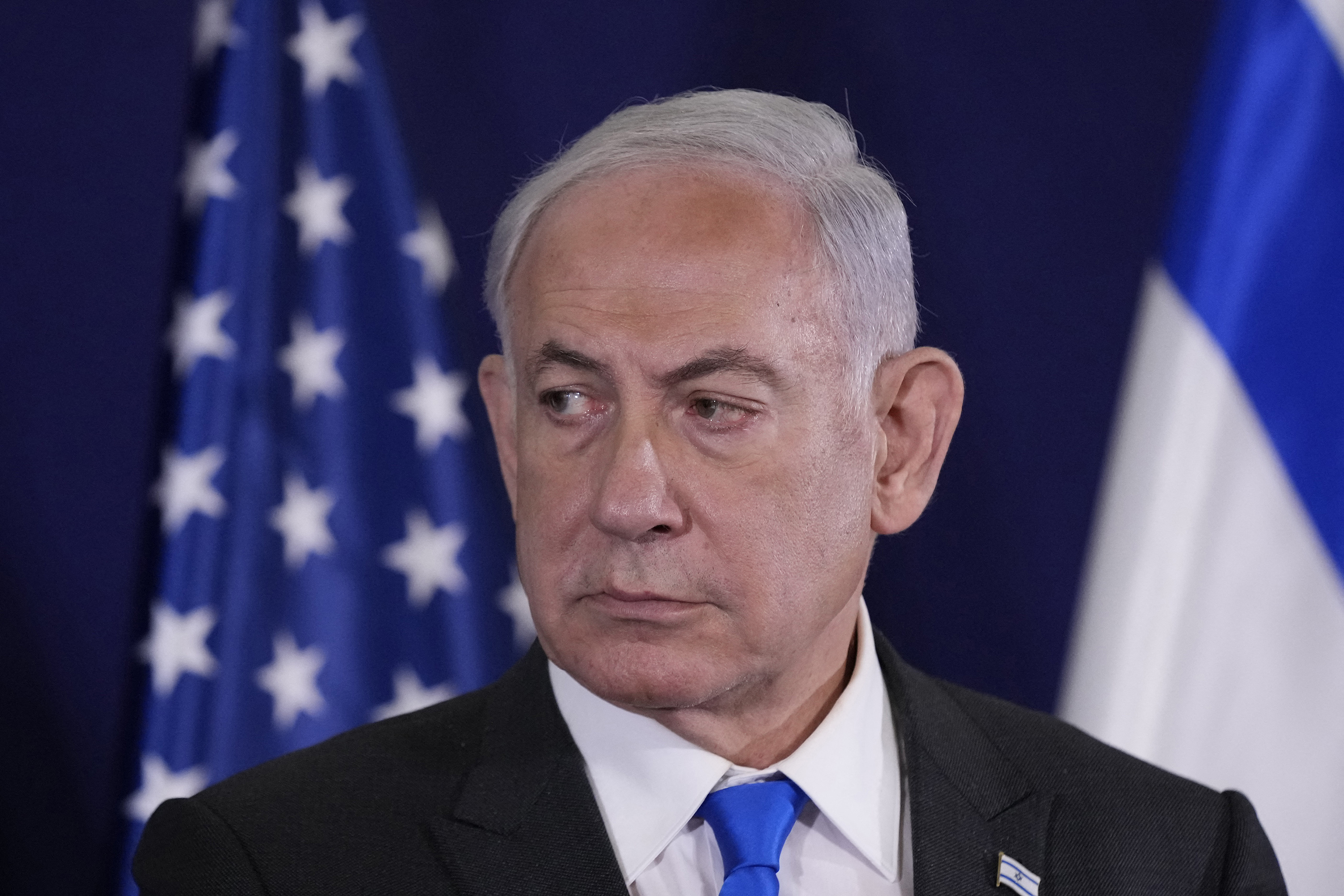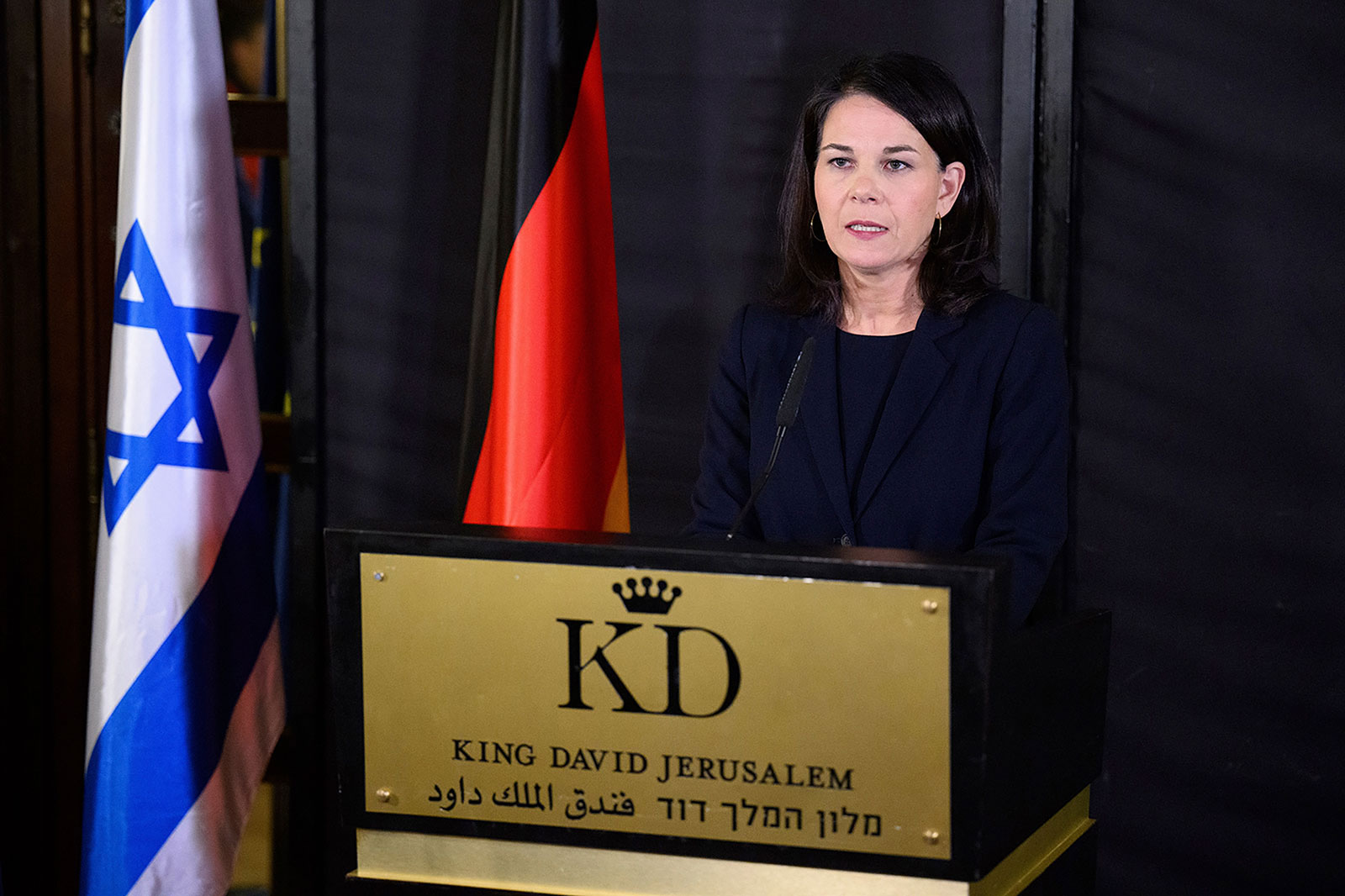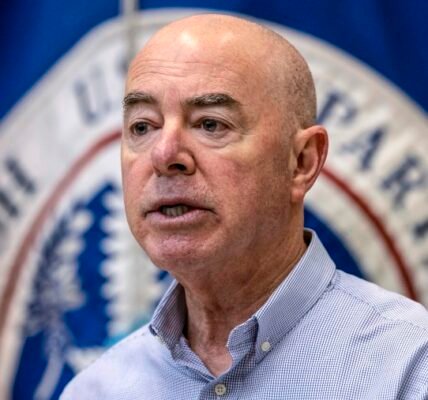Netanyahu vows “powerful action” in Rafah while IDF hits Hezbollah targets in Lebanon. Catch up here
From CNN staff

Israel’s Prime Minister Benjamin Netanyahu on Wednesday reiterated his intention to order concerted military operations in Rafah, vowing that his country will fight “until the absolutely victory.”
Netanyahu said “powerful action” will come in the southern Gazan city after the evacuation of civilians from “battle zones.”
A growing number of world leaders and NGOs have called on Israel to avoid a ground operation in what is now Gaza’s most populated city, with a Red Cross official saying “countless lives are hanging in the balance.”
German Foreign Minister Annalena Baerbock condemned Israel’s planned ground offensive, saying it would create a “humanitarian catastrophe.”
It comes as the Israeli military said Wednesday that it has struck Hezbollah targets in Lebanon, as the Israel Defense Forces chief of staff warned of an ongoing offensive against targets in the neighboring country. The strikes follow an earlier deadly rocket attack from Lebanon on a northern Israeli city.
Here are the latest headlines:
- Israeli jets strike Lebanon: One Israeli solider was killed and eight others wounded Wednesday when a base in northern Israel was targeted by rockets from Lebanon. In response, the IDF struck “Hezbollah terror targets” in the neighboring country. Hezbollah, an Iran-backed armed group that is a regional force in its own right, has not claimed the attack. But Lebanese state media and Hezbollah-owned media reported air raids on several towns in southern Lebanon, including Aadchit, Souaneh and Chehabiya, throughout Wednesday.
- Appeals to stop ground operation: French president Emmanuel Macron and World Health Organization chief Tedros Adhanom Ghebreyesus on Wednesday appealed to Israel not to move forward with a Rafah ground operation. Tedros warned, “I don’t think even hell could describe it…I plead to Israel not to do this.” United Nations special adviser Alice Wairimu Nderitu said the risk of atrocities “is serious, real and high.”
- Snipers at Nasser medical complex: Doctors and medical staff say Israeli snipers have shot dead a number of people as they fled the Nasser Medical Complex in Khan Younis in recent days. “The tanks and the snipers (are) surrounding the hospital from all directions,” a surgeon there said. The IDF confirmed it was operating in the area but did not respond to direct allegations. It has ordered hospital staff and patients inside the medical complex to evacuate, saying it had “opened a secure route” for civilians to leave.
- US concerned over Gaza aid: A US-funded shipment of flour intended for Gaza has not moved the way it was expected to, raising concerns from the White House, national security adviser Jake Sullivan said Wednesday. The shipment was blocked by Israeli customs despite Israel’s war cabinet having approved shipments of flour to Gaza via the Ashdod port following a request from US officials.
- Protection for Palestinians in US: President Joe Biden granted Palestinians in the United States temporary protection from deportation amid the ongoing conflict overseas, according to a new memo. The move comes as the White House faces immense pressure from the Arab-American community over the situation in Gaza.
- Proposed ceasefire resolution: Arab countries at the United Nations are preparing to introduce a ceasefire resolution in the Security Council, which will also call for unimpeded humanitarian relief and the prevention of any transfer of residents of Gaza to a different location.
- Cairo talks: Netanyahu said that Hamas must change its negotiating position before talks can continue in the Egyptian capital. Negotiations on a ceasefire as well as hostage and prisoner releases have been ongoing in Cairo and Israel has told mediators they will continue to engage in talks but have so far rejected a counterproposal made by Hamas that demanded a large release of Palestinian prisoners.
Israeli snipers shoot and kill civilians as they flee hospital in Gaza, according to eyewitness
From CNN’s Sana Noor Haq and Jonny Hallam
Doctors and medical officials in Gaza say Israeli snipers have shot dead a number of people as they tried to leave the Nasser Medical Complex in southern Gaza over recent days.
A trauma surgeon at the hospital said he was eyewitness to the shootings and said at least two people were killed by snipers on Tuesday, with more shot and injured.
The Israel Defense Forces (IDF) have ordered hospital staff and patients inside the medical complex to evacuate and said it had “opened a secure route” for civilians to leave.
But at least eight people trying to escape along the route came under gunfire on Tuesday, said the surgeon, who asked not to be named for security reasons.
In a series of voice notes, the surgeon said medical teams at the hospital have been under intense bombardment for at least three days. His testimony was shared with CNN by his colleague.
Among those injured, the surgeon said, was a 16-year-old boy shot with four bullets at the hospital gate.
“The tanks and the snipers (are) surrounding the hospital from all directions,” the surgeon said in a voice message early Wednesday. “They threatened to bomb the hospital within half an hour.”
The Nasser Medical Complex is the largest remaining functioning medical facility in Gaza.
Reached for comment late Wednesday, the IDF confirmed to CNN that Israeli troops are operating in the area of the Nasser Medical Complex and said they will get back to CNN if anything changes, but did not respond directly to the allegations.
Israel has repeatedly said that its military forces do not target civilians.
Doctors Without Borders condemns Israel’s evacuation order for Gaza’s Nasser Hospital
From CNN’s Mitchell McCluskey
Doctors Without Borders has condemned the Israeli military’s order to evacuate patients, staff and displaced people from Gaza’s Nasser Hospital on Tuesday.
The organization’s staff remained at the medical complex in Khan Younis on Wednesday to treat patients “amid near impossible conditions,” the medical charity, also known as Médecins Sans Frontières (MSF), said in a statement.
There has been heavy fighting near Nasser Hospital for weeks, trapping staff, patients and displaced people inside the medical complex with “very little access to essential supplies,” MSF said.
“People have been forced into an impossible situation: stay at Nasser hospital against the Israeli military’s orders and become a potential target, or exit the compound into an apocalyptic landscape where bombings and evacuation orders are a part of daily life,” said Lisa Macheiner, a MSF project coordinator in Gaza.
“Hospitals should be considered as safe places and shouldn’t even be evacuated in the first place.”
With so much destruction in northern Gaza and the current offensive unfolding in the southern part of the besieged enclave, MSF said that many people have no safe place to flee.
“People ask us ‘Where is it safe? Where should we go?’, but there is no answer to that, and it really leads to a feeling of despair,” Macheiner said.
Inside the US Navy’s frontline fight against the Houthis in the Red Sea
From CNN’s Natasha Bertrand on board the USS Dwight D. Eisenhower
Alarms blared on the USS Dwight D. Eisenhower aircraft carrier in the Red Sea at 4 a.m. on Tuesday morning, warning personnel to prepare for potential flight operations against a Houthi drone that was flying over nearby ships.
That drone was ultimately deemed not to be a threat. But the incident demonstrated how the crew of the carrier are constantly on a heightened alert for incoming threats from the Iran-backed militants in Yemen, who have been routinely targeting commercial ships as well as US and coalition forces in the key waterway with missiles and drones.
On board two vessels spearheading the US response to Houthi attacks, the Eisenhower and the US destroyer the USS Gravely in the southern Red Sea, CNN gained unique access and spoke to sailors and pilots who said the Houthi threat remains both unpredictable and unprecedented.
The US Navy is working at a frenetic pace, deploying jets and firing missiles at a moment’s notice to try to destroy the Houthis’ weapons and infrastructure.
But after dozens of strikes over the last month against Houthi targets both over the Red Sea and inside Yemen, CNN was told that the US military still does not know exactly how much of the Houthis’ capabilities have been destroyed — or how long it will take to deter them for good.
“It’s a wicked problem set that we don’t have a lot of great fidelity on,” said Rear Admiral Marc Miguez, the commander of Carrier Strike Group Two, told CNN.
Biden gives Palestinians in the US temporary protection from deportation
From CNN’s Priscilla Alvarez and Samantha Waldenberg
US President Joe Biden granted Palestinians in the United States temporary protection from deportation amid the ongoing conflict overseas, according to a new memo.
The move comes as the White House faces immense pressure from the Arab-American community over the situation in Gaza.
Late last year, Democrats urged Biden to extend temporary protections to Palestinians in the US, arguing that those already in the country “should not be forced to return to the Palestinian territories, consistent with President Biden’s stated commitment to protecting Palestinian civilians.”
The president has the discretion to authorize what’s known as deferred enforced departure, which protects those covered from removal from the US for a period of time. Those who qualify are also eligible for work permits.
“In light of the ongoing conflict and humanitarian needs on the ground, President Biden signed a memorandum directing the deferral of removal of certain Palestinians who are present in the United States, giving them a temporary safe haven,” National Security Adviser Jake Sullivan said in a statement Wednesday.
“Specifically, President Biden is granting deferred enforced departure for 18 months to Palestinians that are currently in the United States,” the statement continues.
Those convicted of felonies or who pose a public safety threat are not eligible for deferred enforced departure.
Israeli assault on Rafah would create humanitarian catastrophe, German foreign minister says
From CNN’s Niamh Kennedy in London

German Foreign Minister Annalena Baerbock condemned Israel’s plans to launch a ground offensive in Rafah, saying it would create a “humanitarian catastrophe.”
Speaking during a news conference after she met with Israeli Prime Minister Benjamin Netanyahu, Baerbock drew attention to the plight of displaced Palestinians sheltering in Rafah.
“More than half of Gaza’s population is currently seeking shelter in Rafah. 1.3 million people are waiting there in a very small space. They don’t really have anywhere else to go right now,” Baerbock said.
“These people cannot simply vanish into thin air. If the Israeli army were to launch an offensive on Rafah under these conditions, it would be a humanitarian catastrophe in the making,” she said.
This comes as Netanyahu promised a “powerful action” in Rafah after the civilian population is evacuated, according to a statement posted on X.
During her talks, Baerbock said she pushed for “more border crossings be opened quickly” so more humanitarian aid and medical supplies can reach people in Gaza.
The foreign minister also laid out Germany’s support for a ceasefire, saying it would create “a window of opportunity to free the hostages and to get more humanitarian aid in.”
Arab group intends to introduce new Gaza ceasefire resolution at UN Security Council
From CNN’s Richard Roth
Arab countries at the United Nations are preparing to introduce a Security Council resolution calling for an immediate ceasefire in Gaza, they said Wednesday.
The resolution would also call for unimpeded humanitarian relief and would block any transfer of residents of Gaza to a different location — which Arab countries insist is forced collective punishment against international law.
The United States has publicly stated it opposed the draft resolution.
Palestinian envoy Riyad Mansour said the group had good, frank talks with the US Ambassador. Mansour said it is “high time” for the UN to act with a ceasefire resolution. and said the “internal business of the US is their business.”
UN special adviser joins growing concerns around Israel’s military escalation in Rafah
From CNN’s Richard Roth
The Special Adviser on the Prevention of Genocide echoed concerns expressed by other senior United Nations officials about Israel’s plans for a full military incursion in Rafah, which would almost certainly have disastrous consequences for the civilians in the area.
“The risk of commission of atrocity crimes should a full military incursion into Rafah take place, is serious, real and high,” Special Adviser Alice Wairimu Nderitu said.
Nderitu also emphasized the needs to release all hostages unconditionally and ensure humanitarian aid can reach those who need it most, as well as the need to speed up negotiations so that further violence can be prevented and a sustainable ceasefire can be implemented.
“It is imperative that the protection of civilians is prioritized and that international humanitarian law is respected at all times,” the special adviser said. “Enough of violence and enough of suffering of those who are most vulnerable, in Rafah and in the entire Gaza Strip.
Netanyahu vows “powerful action” in Rafah after civilian evacuation, despite some appeals to avoid incursion
From CNN’s Amir Tal in Jerusalem and Jen Deaton
Israel’s Prime Minister Benjamin Netanyahu reiterated his intention to order Israel’s military to go into Rafah after the civilian population is evacuated, according to a new statement posted on X Wednesday.
“We will fight until the absolutely victory and this includes a powerful action also in Rafah after we allow the civilian population to leave the battle zones,” Netanyahu said.
Some background: US President Joe Biden told Netanyahu previously that an operation in Rafah “should not proceed” without ensuring the safety of the people sheltering there, the White House said.
Some other world leaders and NGOs including the United Nations have called on Israel to avoid a ground operation in what is now Gaza’s most populated city.
French president Emmanel Macron and World Health Organization chief Tedros Adhanom Ghebreyesus on Wednesday appealed to Israel not to move forward with a Rafah ground operation.
Netanyahu said on Sunday that Rafah is “Hamas’s last bastion,” and that Israel will get the “remaining Hamas terrorist battalions” there, in an interview with ABC News.


